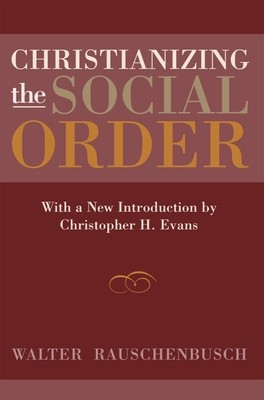
- We will send in 10–14 business days.
- Author: Walter Rauschenbusch
- Publisher: Baylor University Press
- ISBN-10: 160258236X
- ISBN-13: 9781602582361
- Format: 15.5 x 22.7 x 3.4 cm, minkšti viršeliai
- Language: English
- SAVE -10% with code: EXTRA
Reviews
Description
Christianizing the Social Order is Walter Rauschenbusch's most comprehensive study of the relationship between Christianity and social reform--most specifically for political and economic justice--and a follow-up to his best-selling Christianity and the Social Crisis. A pioneering work of what became known later in the twentieth century as "public theology," Christianizing the Social Order asks "How can the fundamental structure of society be conformed to the moral demands of the Christian spirit?"
First published in 1912, the classic work begins describing the social awakening of religious institutions at the time, then moves subject the then-present social order to moral analysis, and, finally, suggests methods of advance. With a message that is still much in need today and now with a new introduction by Christopher H. Evans, contemporary readers may be challenged anew and reflect on the ways Rauschenbusch's legacy relates to the social, political and religious context of our time.
EXTRA 10 % discount with code: EXTRA
The promotion ends in 23d.05:00:56
The discount code is valid when purchasing from 10 €. Discounts do not stack.
- Author: Walter Rauschenbusch
- Publisher: Baylor University Press
- ISBN-10: 160258236X
- ISBN-13: 9781602582361
- Format: 15.5 x 22.7 x 3.4 cm, minkšti viršeliai
- Language: English English
Christianizing the Social Order is Walter Rauschenbusch's most comprehensive study of the relationship between Christianity and social reform--most specifically for political and economic justice--and a follow-up to his best-selling Christianity and the Social Crisis. A pioneering work of what became known later in the twentieth century as "public theology," Christianizing the Social Order asks "How can the fundamental structure of society be conformed to the moral demands of the Christian spirit?"
First published in 1912, the classic work begins describing the social awakening of religious institutions at the time, then moves subject the then-present social order to moral analysis, and, finally, suggests methods of advance. With a message that is still much in need today and now with a new introduction by Christopher H. Evans, contemporary readers may be challenged anew and reflect on the ways Rauschenbusch's legacy relates to the social, political and religious context of our time.


Reviews